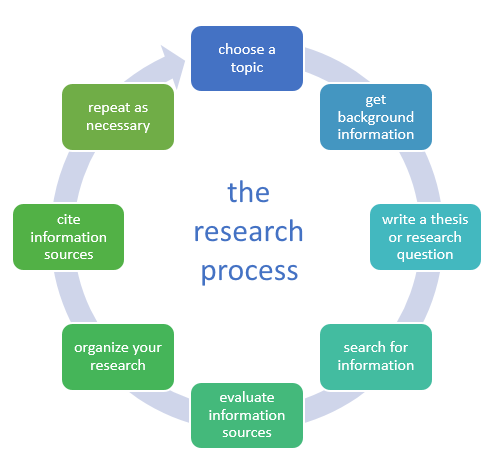Research paper. The two most dreaded words for the college student. How do you navigate these academic trials (and is it possible to even enjoy them)? Research is a time-consuming process, yet one that is important to do well. Good research is, of course, a protection against plagiarism, but it is more importantly an opportunity for you to explore something that deeply interests you!
My hope is to provide a brief overview about how you might approach your first college research paper (or any long essay you are assigned!). The research process can be broken into three “stages”: Definition, drafting, and discussion. Each is vitally important, and while it can be tempting to skip over one of them when you write, all three are crucial. The transitions between stages are blurry and organic; writing processes are as numerous as the people on earth. So see the thoughts below as suggestions to consider as you seek to find your personal approach to writing.

Definition: Let’s Brainstorm
- Define your research question. As you start your paper, you might consider reviewing the assignment description and requirements given to you by your professor. From here, try writing out a list of 5-10 interesting ideas that match the assignment prompt. (For more help with picking a topic, check out this post!)
- Define your discourse community. In academic writing, we use the term “discourse community” to describe our audience. More specifically, a discourse community is an audience that shares a specific focus or goal. (A helpful explanation of discourse communities can be found here). Try asking yourself, “To what group of people am I writing this essay?” Your writing style and the structure of your argument should be determined by your discourse community. A research paper about Greta Gerwig’s film adaptation of Little Women would look very different depending on if it was intended for a discourse community of neuroscientists or a discourse community of literary scholars.
- Define your sources. Typically after formulating a research question and a specific audience, it’s good to start finding sources that fit both your topic (i.e., a relevant source) and your audience (i.e., a credible source). An excellent place to find sources for a specific academic discipline is through the Library’s online research guides (go to the “Recommended Resources” tab)! Or, consider contacting a subject librarian for your area of study.
Drafting: Get Writing
- Draft Your Bibliography. While the bibliography goes at the end of your paper, it’s typically where your drafting process should start. As you read sources, you’ll want to start recording the citation data for each of your sources. This ensures that when you’re ready to write, you already have all the information to give credit where credit is due. Our Writing Center resources have helpful information about creating bibliographies in MLA, APA, and Chicago styles. Additionally, the Purdue OWL is an excellent resource for citations. (You might also consider trying a research assistant app, like Zotero, which can keep track of citation data for you).
- Draft your literature review. As you draft your paper, consider beginning by simply writing a section that describes the sources you have consulted–what do they say and how do they interconnect? This gives your reader a brief summary of the research you have done, adding credibility and context for your argument. Additionally, the process of articulating the arguments of other scholars may help you figure out your own thoughts. It’s like another round of brainstorming! (Here is a great article explaining more about crafting a great literature review. Or, check out this short video!).
- Draft your contribution to the scholarly conversation. Academic discussions are often compared to a long conversation–one to which you are arriving mid-way through (here’s a great explanation of this analogy). Through reading and reviewing other sources, you garner knowledge about what people have said in the “conversation” prior to your arrival. Through your paper, you have the opportunity to enter this conversation and share something new. As you do research, consider asking yourself: “What about this topic interests me?” or “Are there any questions I have that my sources haven’t answered?” Such questions will likely lead you toward the focus for your paper. Or, if you find yourself forming a strong opinion about something as you read your sources, try jotting down those thoughts – this might lead you to a thesis! (If you want more information about this step in the process, check out this article, which includes a sample of paper! This is developed from a method for academic argumentation known as CARS: Creating a Research Space).

Discussion: Time to Edit & Revise
- Discuss with yourself. Now that you’ve written your draft, it’s time to look over it with other people! But before you do that, it’s usually a good idea to read through the draft yourself (maybe even read it out loud). I typically find that I catch a lot of simple mistakes this way.
- Discuss with others. After reading through your draft, consider giving it to a friend (or even professor) to get their feedback on your writing. Often, this might take the form of an in-class writing workshop. But even if your class doesn’t have this, it can be really helpful to have another pair of eyes to look over your paper.
- Discuss with a Writing Consultant. Ok, I know this is a shameless plug, but the point remains true. Consider scheduling an appointment at the Writing Center to talk about your paper. The Writing Center has student Writing Consultants from across academic disciplines who are specifically trained to help students with their writing. (Don’t know what to expect or how to make an appointment? Check out this post.)
Why does it matter how I do my research?
Research can be a taxing, time-consuming process. Why is it important to do it well? Aside from the commonly-referenced offense of plagiarism and academic dishonesty (which is a big deal), there are several reasons why it’s important to have a thoughtful approach toward your research process. First, research projects will train you in skills that will reach beyond college – how to judge sources effectively, how to give credit for others’ ideas, and how to synthesize information. On a more superficial level, good research will likely lead to better papers – and better grades. Even if those aren’t compelling enough, research can be an opportunity for you to explore something you are interested in. It can be a chance to just be curious, which is, after all, what academic inquiry is all about!
P.S. Perhaps reading this article has made you want to research the academic research process itself more thoroughly. If so, consider checking out these helpful resources on key techniques in academic writing and John Swales’ CARS (“Creating a Research Space”) method.
